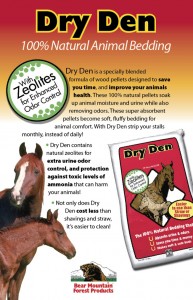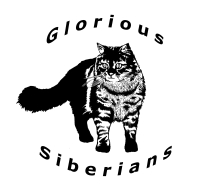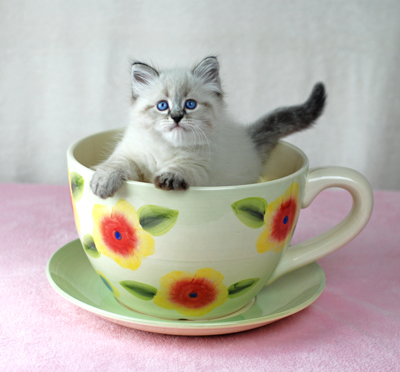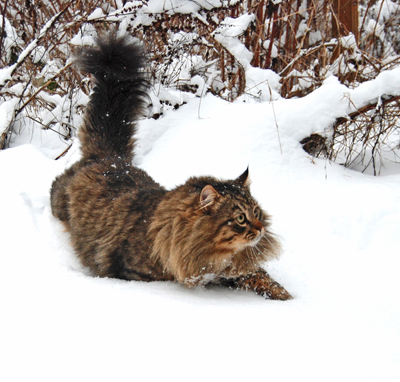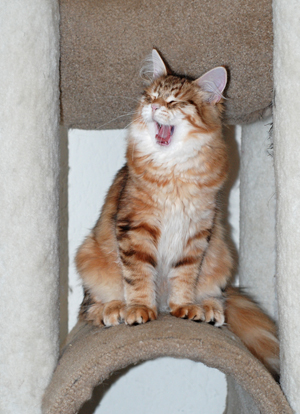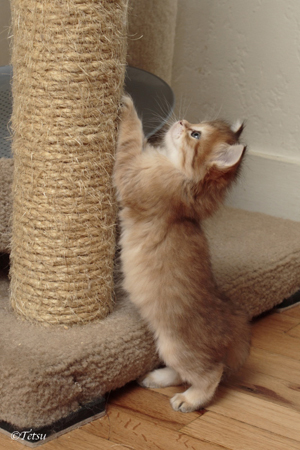Before we get started, I’d like to go over some basics. It’s important that your cat use the litter box, therefore we want to make choices that support kitty using the litter box.
Which cat litter? The article and information below will bring you up to speed. Please choose a “natural” type litter without added fragrance. Cats have an extremely good sense of smell, even better than dogs according to some experts. A litter that smells perfumey is not attractive to cats. A clean litter box is very inviting to a cat, so do your part by keeping the boxes clean. Plastic will absorb the smell of urine, so replace the litter boxes every year.
How many boxes? Especially during your cat’s first year, provide plenty of litter boxes. The more square footage in your home, the more litter boxes you need to have out. We want to make it easy for your cat to find and use a box. If your home is two, three or more stories tall, you need to provide a box on every floor.
When your Siberian is a little over a year old you may start decreasing the number of litter boxes. By now you should know which locations are your cat’s favorites. Consider putting two boxes in your cat’s favorite spot as you eliminate the other boxes.
Now for the Scoop on Cat Litter
By: Shelagh McNally, an environmental journalist based in Montreal.
We love our cats but that kitty litter has got to go! Not only is clumping litter leaving a huge carbon footprint, it’s also bad for our feline friends. The main culprit is sodium bentonite, a natural clay ingredient that expands into a hard mass when it comes into contact with moisture. While this is convenient for cleaning, it’s not great for kitty. Cats inhale fine sodium bentonite particles when they dig in the litter. Once inhaled, the clay expands when it hits their lungs, causing asthma and other lung problems. Cats can also ingest the clay while cleaning their paws and some even develop sores on their pads from it.
Silica-based litters are not much better. This porous granular form of sodium silicate absorbs odours and moisture but is also easily inhaled by humans and felines. It’s been linked to lung cancer, bronchitis and tuberculosis. Some cats can end up with a fatal form of pulmonary tuberculosis called silico-tuberculosis. Both these conventional litters have an adverse effect on the environment. Produced by the destructive method of strip-mining, clay and silica litter can’t decompose any further because they are already in their natural state. When you consider that we send about two million tons of cat litter every year to the landfill that adds up to a lot of fecal feline matter hanging around.
Recommended Cat Litters
Swheat Scoop litter is made from Naturally Processed Wheat and other Grains. Biodegradable, free of chemicals or added fragrance (I’ve read though that it does smell of wheat).
Yesterday’s news is today’s litter Several brands of kitty litter are now made from recycled newspaper. These super-absorbent and non-abrasive paper pellets won’t cling to any furry behinds and are biodegradable. Yesterday’s News and Good Mews are two popular brands sold in many pet stores.
Corny litter The World’s Best Cat Litter is made from good old fashioned Midwest corn. With its unique microporous structure, corn is capable of trapping and absorbing ammonia, responsible for the smell that makes us gag while changing the box. One Earth Cat Litter also uses fast clumping corn cob granules but has added yucca and pine for a natural fragrance. Both types are suitable for self-cleaning automatic litter boxes.
Pine fresh Feline Pine uses pine sawdust reclaimed from lumberyards that has been cleaned, kiln-dried, and pressurized to remove oils. The end product is dust-free and sterile pellets that are super absorbent. Many vets recommend this litter for post-surgery because it has been sterilized. I’ve read that some find it has a distinct pine smell.
Don’t flush!! Although most of these green litters are septic- and sewer-safe, it’s best not to flush them into our waterways. Cat feces contains the Toxoplasmosis gondii (TG) parasite, dangerous to pregnant women and marine life, particularly sea otters. Unfortunately TG is not filtered out in most water treatment plants. Please do not flush your used litter. You can throw it into the compost bin but only if you intend to use the compost on trees, shrubs, flower beds or in outdoor potted plants and not for vegetables or fruits.
Glorious Siberians uses Dry Den. This is a wood pellet product with Zeolites for natural ammonia odor control. Sodium Bentonite and Zeolites are different. Bentonite is a clay whereas zeolite is a crystallized mineral created by lava and water. Dry Den pellets are produced locally in Oregon by Bear Mountain Forest Products:
“Bear Mountain Forest Products has been producing premium quality forest products in Oregon since 1988. What differentiates our products from others is our commitment to quality. We purchase only clean sawdust and shavings from reliable sources. Then we dry and screen our products to ensure consistent quality. The results are wood pellets that burn hotter and cleaner, stall bedding products that are softer and healthier, and wood briquettes that burn longer and cleaner. We stand behind all our products, and our retail dealers that sell our products.”
The best thing about using this product is that we don’t scoop! We add Dry Den to a depth of two inches, which isn’t very much. When soiled we dump out the entire litter box into a plastic bag (This is a compostable product). Refill litter box up to two inches. Quick and easy. This product is also very affordable. Near my home it is $6.50 for 40 pounds.
Sometimes kittens will sleep in their litter box. This means that they’re not afraid of their litter box, and feel safe. This is a good thing!
Suggested Litter Box
I highly recommend simple, open litter boxes. Cats are more comfortable using a box when they have good visibility of what’s around them. Elimination is a time when a cat is vulnerable to being attacked and eaten by hawks, coyotes, wolves etc. This is a cat’s natural instinct.
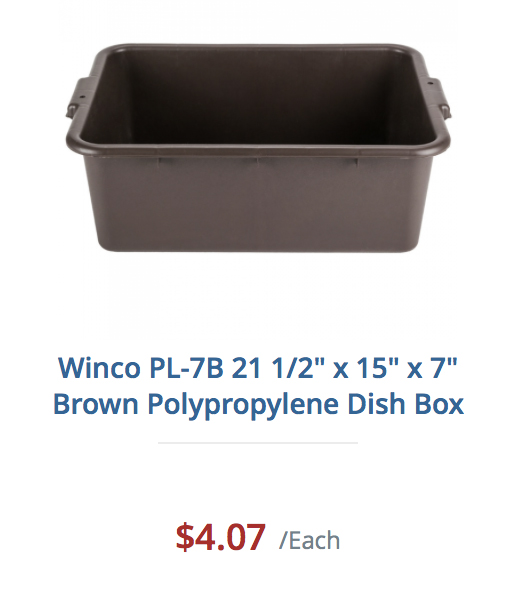
Bus boxes from Restaurant supply stores
Bus boxes from restaurant supply stores are very durable, easy to clean, and are affordable. Siberians generally want a good sized box, about 21 inches long, 15 inches wide. and 7 inches deep.

